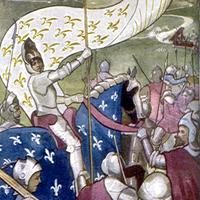28. A Famous Voyage
"The Prince, who, Heaven inspired, To love of useful glory roused mankind, And in unbounded commerce mixed the world. " —THOMSON. Perhaps of all the voyages made in the time of Prince Henry of Portugal, that of the Venetian voyager, Cadamosto, is the most famous; and we have an account of it in his own words. Sailing from Venice to France, Cadamosto was driven by a storm to shelter in the Prince's town near Cape St Vincent. Here he heard of the glorious and boundless discoveries of the Prince's ships, and a passionate desire to see the world and explore the unknown fired him with eagerness to enter the Prince's service. "No countryman of mine had ever tried the like, and my certainty of winning the highest honour and gain from such a venture made me offer myself," he tells us in his story. On March 21, 1455, Cadamosto sailed for Madeira, then on to the newly found Canary Islands—which had been called by Hanno of old, the Islands of the Blessed—and so to the coast of Africa, landing at the white cape, Cape Blanco.
"The natives of Cape Blanco are black as moles, but dress in white flowing robes," says the old traveller and chronicler, "with a turban wound round the head. Indeed, plenty of Arabs are always hovering off the Cape for the sake of trade with Prince Henry's ships, especially in silver, grain, and woven stuffs, slaves and gold. " Coasting on to the southward, he came to the great river Senegal, where the natives were of a colour "something between black and ashes in hue." When first they had seen the ships from Portugal sailing along their coast, they had thought them to be birds coming from afar and cleaving the air with white wings. When the sailors let down the sails and drew the ships to shore, the natives thought they must be fishes, and they stood stupidly on the shore gazing at the new wonder.
On sailed the explorers, south and ever south, till they reached Cape Verde, the most western point of West Africa. The long spell of white sand had now given way to green grass and trees, while native villages were dotted about on the sea-shore. But the Portuguese knew Cape Verde already. Farther south they did not know. So Cadamosto sailed on. They reached the mouth of the river Gambia, and started up the stream to explore farther. But the negroes, "sooty black in colour, dressed in white cotton with helmets on their heads, two white wings on either side and a feather in the middle," came against them. The natives were hostile and unfriendly, so Cadamosto sailed away.
He had already sailed farther south than any of the other Portuguese ships, to within measurable distance of the equator, that imaginary line that divides the world in two parts. Cadamosto did not know that the world was round. He therefore tells Prince Henry on his return, as a curious piece of information, that the Pole Star had sunk so low that it almost touched the sea. Also that they had seen, in their cruise down the African coast, the brilliant group of stars, the Southern Cross, shining through the wonderful June nights.
Cadamosto had done much, but the Prince was not yet satisfied. In 1458 he planned a yet longer voyage, giving the command to his most faithful servant, Diego Gomez. His orders had been simple enough. He was just to sail as far as he could, farther and farther south. Would these explorers never find out what lay beyond this Sea of Darkness? Much had been learnt, but how much more remained to be learnt.
Gomez started forth and sailed beyond Cape Verde, turning due west and coming on the Cape Verde Islands, important to-day as coaling-stations for the large steamers plying between England and Africa and America. He had stories to tell of golden rivers, of gold mines, of ivory tusks and elephant teeth, of houses made of sea-weed covered with straw. He returned to Portugal only in time to be present at the death of his beloved master, Prince Henry.
Still working for the cause he had at heart, his motto, "Desire to do well," ever before him, Prince Henry fell ill. In his own town, near Cape St Vincent, he lay dying, within sound of the great Atlantic rollers, within sight of that vast Sea of Darkness he had failed to fathom.
Perhaps he had done more than ever he dreamt. His energy, his untiring hope, his unwavering purpose and steady determination, had awakened in his countrymen a spirit of enterprise and adventure. He had indeed roused mankind to the love of useful glory, "and in unbounded commerce mixed the world. "

